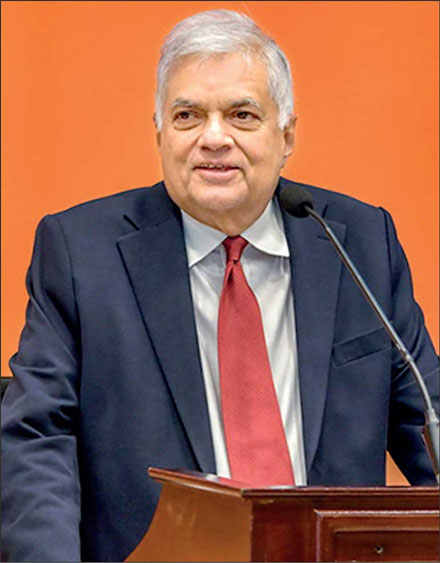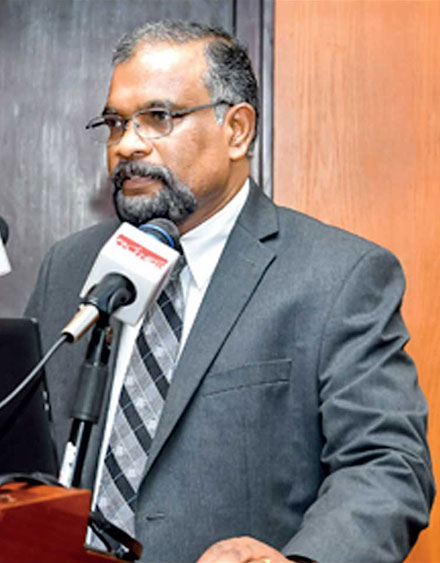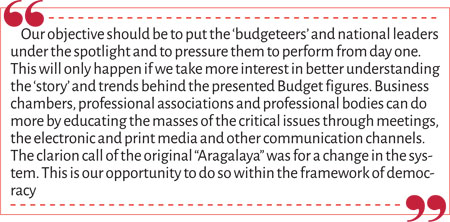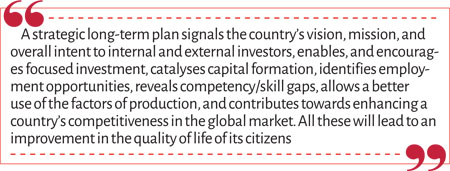Thursday Feb 19, 2026
Thursday Feb 19, 2026
Friday, 10 November 2023 00:35 - - {{hitsCtrl.values.hits}}

President and Finance Minister Ranil Wickremesinghe

Treasury Secretary Mahinda Siriwardena
 The unveiling of Sri Lanka’s National Budget 2024 by President Ranil Wickremesinghe is scheduled for 13 November 2023. With 2024 and 2025 expected to be ‘election’ years, there will be great temptation to resort to vote winning short termism at the expense of sustainable long-term prosperity. Contrary to expectations, it is my hope, and certainly the hope of all Sri Lankan citizens, that the Budget 2024 will not be a stand-alone proposal but the ‘2024’ component of a very long-term plan.
The unveiling of Sri Lanka’s National Budget 2024 by President Ranil Wickremesinghe is scheduled for 13 November 2023. With 2024 and 2025 expected to be ‘election’ years, there will be great temptation to resort to vote winning short termism at the expense of sustainable long-term prosperity. Contrary to expectations, it is my hope, and certainly the hope of all Sri Lankan citizens, that the Budget 2024 will not be a stand-alone proposal but the ‘2024’ component of a very long-term plan.
“Regaining Sri Lanka – Vision and Strategy for Accelerated Development – 2002” and “Vistas of Prosperity and Splendour – 2019” are examples of attempts made by national leaders, in the past, in kickstarting Sri Lanka’s social and economic renaissance. As history will record, both these initiatives, like many other smaller initiatives, came to nought because of the initial visions giving way to political greed and/or other intervening events. Long-term plans are essential at a national level because they enable the Government to identify key industries, develop infrastructure, attract investment, and foster innovation.
More importantly, a strategic long-term plan signals the country’s vision, mission, and overall intent to internal and external investors, enables, and encourages focused investment, catalyses capital formation, identifies employment opportunities, reveals competency/skill gaps, allows a better use of the factors of production, and contributes towards enhancing a country’s competitiveness in the global market. All these will lead to an improvement in the quality of life of its citizens.
The week leading to, and the two weeks following, the presentation of the National Budget are usually awash with speculation, innuendo, interesting and intense discussion on what should be/should have been included and what should be/should have been avoided et cetera. While professional service firms and professional and technical associations vie with each other in attempting to be the first to inform their clients and members the Budget’s pros and cons and other technical nuances, many are the times where experts and analysts have, in their bid to be the first at the post, failed to ask the searching questions re the presented Budget. For example, I have attended many Budget seminars in Sri Lanka in the past 23 years, and it is very rarely that attendees and/or the organisers, have asked the Government on the progress made against previous budgets.
Make public officials accountable for their promises
Yes, the Budget Speech may contain hazy, high-level references, but is that adequate? We must make public officials accountable for their promises. Accountability of the past is essential in enhancing the credibility of the future. Without credibility there will be no buy-in of the Budget by the citizens and other stakeholders of our country. I hope this year our approach in evaluating and understanding the Budget 2024 will be different. In making this happen, effectively, Budget Seminar organisers must limit the politics laden speeches and marketing messages, minimise the regurgitation of the already known and, instead, devote more time to identifying incongruence and gleaning insights.
The problem in Sri Lanka is that we pay unnecessary homage to political leaders. Yes – we must respect them. However, they must not be treated like gods unless they have performed to deserve such likeness. We must not feed their unproductive narcissism. Analysts, experts, and citizens have failed, miserably, in previous years, in piercing the veil of deception by avoiding direct, straightforward, and tough questions in public fora. I say deception because according to a recent Verite Research Report the lack of Government transparency on budget proposals in 2022 and 2023 has increased to 70% from the 45% recorded between 2017 and 2021, meaning that information was not disclosed proactively online or in response to the right to information requests filed.
The report reveals, inter alia, that promises made a year ago have no owners nor funds allocated, that successive Budgets from 2014 have allocated funds to set up new Export Processing Zones but no such facilities have been set up and that 68% of the proposals for which progress is unknown account for 97% of the fund allocation. Performance against previous targets is a basic starting point in developing a Budget for a new year. Actual against Budget is a standard monitoring mechanism used by any organisation in pursuing accountability. Why should the Government be an exception? So, ask this for starters. We must alter the comfort flow of the presenters.
At Budget seminars and discussions, a disproportionate amount of time is spent on discussing Taxation Revenue and Taxation Policy. This is understandable since taxation, while representing a substantial proportion of Government revenue, is often used as a tool in promoting investments particularly in a developing country such as Sri Lanka. In the context of tax collection, I am waiting expectantly to hear what measures will be taken this year in broadening the tax net. Or will the compliant few be the punching bag as usual with an unimaginative Government traversing the path of least resistance.
 Taxation policy a key determinant of individual disposable incomes
Taxation policy a key determinant of individual disposable incomes
Taxation policy is also a key determinant of individual disposable incomes, an indicator which modulates business confidence. Notwithstanding the afore, I believe that an understanding, of the planned Government expenditure whether it be recurring, capital, project based, one-off in pursuit of a specific outcome or in respect of welfare/safety nets, is as important as revenue because it signals forward information which is vital in formulating corporate, and personal, strategies. Unfortunately, the actual expenditure of the Government, just like revenue, has never been in line with the budget both in terms of substance and value.
All citizens should care how governments budget and account for their spending. Bad financial information means services suffer and public servants cannot be properly held to account. This has led to investors getting their fingers burnt. The “once bitten, many times shy” attitude of potential investors which has been engendered by such inconsistency is the principal reason for the lack of local investment, capital formation and the lower-than-expected foreign direct investment to the country. It is for these reasons, and more, that I hope the Budget 2024 will be a sub-set of a very long-term plan aimed at restoring business confidence.
Economies grow when consumers and business leaders feel confident. Consistency and credibility increase confidence. When consumer confidence declines, consumers become less certain about their financial prospects, and they begin to spend less money. This, in turn, affects businesses as they begin to experience a decrease in sales. Confident consumers will spend more and, on the back of such behaviour, confident business leaders will invest more in growing their organisations. Therefore, at the Budget Seminars spend more time questioning the components of expenditure and detecting whether the subject expenditure is a part of a long-term vision and mission or whether it is just an ad-hoc measure designed to win votes.
Given Sri Lanka’s current economic situation, the expenditure components anticipated to attract interest are those relating to Agriculture, Irrigation, Education, Health, Tourism, Power and Energy, Water Supply, Digitisation of Revenue Collection, Restructuring of State Owned Enterprises, Export Development, Safety Nets and Elections and the expenditure likely to be under the microscope are those relating to Defence, Public Administration and Road Development, road development simply because of its susceptibility to corruption.
It is time that we muted the applause of the Budget and discarded the reluctance to shake the tree by asking blunt questions. This may not come naturally to us, Sri Lankans, because our innate cultural values dissuade us challenging age and experience in public. We must change these beliefs in serving the public interest. It is, indeed, the absence of challenge which has brought us to our current dismal position. We must voice our right to information and through such information heighten our understanding of the strategic vision of the country.
As voting citizens, we must get more involved by asking the ‘budgeteers’ their assumptions of leading economic indicators such as inflation, interest rates, yield curves, money supply, exchange rates et cetera, lagging indicators such as unemployment rates, consumer price indices et cetera and coincident indicators such as gross domestic product, balance of payment and trade deficits, just to name a few. We must do this in laying the platforms of accountability.
There is little point in attending the Budget Seminars, asking polite questions, debating issues for two weeks or so and then getting back to our disinterested ways. Our objective should be to put the ‘budgeteers’ and national leaders under the spotlight and to pressure them to perform from day one. This will only happen if we take more interest in better understanding the ‘story’ and trends behind the presented Budget figures. Business chambers, professional associations and professional bodies can do more by educating the masses of the critical issues through meetings, the electronic and print media and other communication channels. The clarion call of the original “Aragalaya” was for a change in the system. This is our opportunity to do so within the framework of democracy.
 Overarching economic goal of a nation
Overarching economic goal of a nation
Let us be mindful that the overarching economic goal of a nation is to produce a high and rising standard of living for its citizens. As argued by Michael Porter in “The Competitive Advantages of Nations,” the central goal of government policy towards the economy is to deploy a nation’s resources – labour, capital, and land, with high and rising levels of productivity. Productivity is the principal determinant of a nation’s standard of living in the long term. Productivity in the use of ‘human capital,’ productivity in the use of ‘land’ and productivity in the use of ‘capital’ secured by taxation, foreign direct investments (FDIs), internal and external borrowings et cetera are the key drivers of national per capita income.
Sri Lanka’s Gross Domestic Product (GDP) per capita is estimated to be $ 3,833 in 2023 as compared to the $ 3,988 in 2022 and an all-time high of $ 4,496 in 2018. Ask the “budgeteers” what GDP per capita they estimate by December 2024 and in the years thereafter. High productivity not only supports elevated levels of income but allows citizens greater options between work and leisure. High levels of income will attract more taxes. More taxes enable Government to up the standards in areas such as health, safety, education with a STEAM (science, technology, engineering, arts, and mathematics) emphasis, public transport, and technology et cetera.
Productivity growth can only happen if an economy continually upgrades itself through relentless improvement and innovation in existing industries and the capacity to compete successfully in new industries. Government is therefore an enabler. Other than in a few exceptional instances where a profit motive must take second place to the provision of an effective service at an affordable price, and where market failure is likely in the absence of Government involvement, Government must not engage in business. Interrogate, and assess, the Budget in determining to what extent these aspects have been addressed.
As a citizen of this country, it is your right to expect that the annual National Budget is a subset of a long-term Strategic Plan. A Plan which clearly articulates a time-lined roadmap to economic prosperity. Having declared bankruptcy, Sri Lanka has extremely limited capital at its disposal. One of the defining features of economics is scarcity, which deals with how people satisfy unlimited wants and needs with limited resources. Scarcity affects the monetary value people place on goods and services and how governments and private firms decide to distribute resources. The Budget must, therefore, strive to create the biggest bang for its limited buck.
Given the need to focus, there will always be winners and losers. The probability of a loser accepting the hard realities of the situation largely depends on the transparency of the Budget.
Transparency is key to inspiring a shared vision and a shared vision is essential in winning the hearts and minds of most of Sri Lanka’s citizens. “Budgeteers” – please note. Citizens – pierce the veil. Penetrate deep and venture beyond Taxation in enhancing your understanding of the Budget. This is the understanding which will anchor your support or rejection of the Budget.
It was Cicero, the Roman Statesman and Lawyer, who said: “The budget should be balanced, the Treasury should be refilled, public debt should be reduced, the arrogance of officialdom should be tempered and controlled, and the assistance to (and from) foreign lands should be curtailed lest Rome become bankrupt.”
(The writer is a Leadership Coach, Mentor and Consultant and boasts over 50 years of experience in very senior positions in the corporate world – local and overseas. www.ronniepeiris.com.)